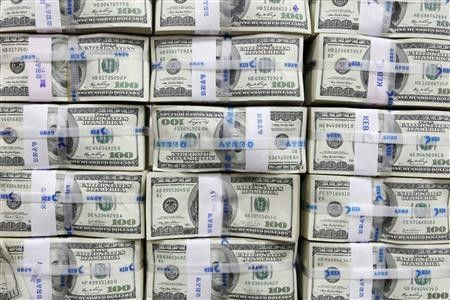Dollar rallies on debt deal, but downside risks seen

The dollar rallied against the yen and the Swiss franc on Monday as investors unwound safe-haven plays on expectations U.S. lawmakers would pass a deal to raise the country's borrowing limit, averting the risk of an immediate default.
Investors covered short positions in the dollar after a sell-off in the past week or so, but many in the market were skeptical that the plan would be enough for Washington to hold onto its prized triple-A credit rating.
The U.S. Senate is expected on Monday to pass the deal, which raises the debt ceiling and cuts about $2.4 trillion from the deficit over the next decade.
Analysts expect dollar selling could re-emerge if ratings agencies suggest those cuts are not sufficient for Washington to improve its fiscal position.
"There will be relief in market sentiment today and maybe this week, as the U.S. will avoid a default, but the problems are not fully solved so I think it will be a muted reaction," said Richard Falkenhall, currency strategist at SEB in Stockholm.
"You have the risk of ratings agency downgrades, and no further fiscal stimulus in this deal," he said, adding that this would be negative for the dollar.
In early European trade, the dollar traded 1 percent higher on the day at 77.53 yen, having climbed to as high as 78.05 yen in earlier trade.
Against the Swiss franc, the U.S. currency also traded up a percent at 0.7930 francs, recovering from a record low near 0.7850 francs hit late last week.
The euro was flat on the day at $1.4402, after rising as high as $1.4424 as news about the deal prompted some investors to pick up currencies perceived to be higher risk.
The Australian and New Zealand dollars -- which often appreciate on demand for risky assets -- each rose around 0.4 percent versus their U.S. counterpart.
Despite the mild relief rally in the dollar versus safe-haven currencies, traders pointed out that the greenback's recovery had been relatively limited given that it fell nearly 7 percent versus the franc and 3.5 percent against the yen last month.
Some traders said that, if anything, the market was positioned for the possibility of a U.S. downgrade.
"If they cobble something together it might ease pressure on USD but then there's still a possible downgrade as the next concern," said a trader in London.
Another trader said: "Anything from ratings agencies will likely cause a knee-jerk reaction (to sell the dollar)," adding that "thin and nervy" markets were keeping traders from taking on big positions either way in the dollar at the moment.
YEN INTERVENTION CONCERNS
Demand for risky assets was dampened by sluggish manufacturing purchasing managers' surveys for many euro zone countries on Monday, which highlighted economic weakness in the region as struggling periphery countries require more assistance to help repay their debts.
Some traders said that Spain's surprise announcement on Friday that it would call an early general election ratcheted up political uncertainty in the euro zone, which may ultimately have some impact on how much more bailout funds countries including Greece may receive.
The dollar pulled back from a four-month low of 76.70 yen hit last week, but it remained in range of an all-time low of 76.25 yen, given lingering worries of a U.S. sovereign downgrade, as well as concerns about the outlook for U.S. economic growth.
"Downward pressure on dollar/yen is likely to strengthen, once short-term dollar short covering runs its course," said Junya Tanase, chief FX strategist for JPMorgan Chase Bank in Tokyo.
A further appreciation in the yen would keep alive the possibility that further gains in the Japanese currency could prompt yen-selling intervention by the Japanese authorities.
© Copyright Thomson Reuters 2024. All rights reserved.




















